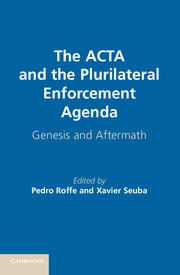Book contents
- Frontmatter
- Contents
- List of Contributors
- Foreword
- Acknowledgments
- Acronyms
- Introduction
- PART I THE FINAL ACT: ITS MAIN FEATURES AND CONTENTS
- PART II DOMESTIC LEGISLATIVE CHALLENGES
- 9 ACTA’s Constitutional Problem in the United States
- 10 Trick or Treaty?
- 11 A Brazilian Perspective
- 12 Lessons to Be Drawn from the ACTA Process
- PART III IMPACT ON RELATED PROCESSES
- PART IV VIEWS FROM STAKEHOLDERS: LESSONS
- PART V WHAT LIES AHEAD ACTA
- Annex I Anti-Counterfeiting Trade Agreement
- References
- Index
- References
9 - ACTA’s Constitutional Problem in the United States
Published online by Cambridge University Press: 05 December 2014
- Frontmatter
- Contents
- List of Contributors
- Foreword
- Acknowledgments
- Acronyms
- Introduction
- PART I THE FINAL ACT: ITS MAIN FEATURES AND CONTENTS
- PART II DOMESTIC LEGISLATIVE CHALLENGES
- 9 ACTA’s Constitutional Problem in the United States
- 10 Trick or Treaty?
- 11 A Brazilian Perspective
- 12 Lessons to Be Drawn from the ACTA Process
- PART III IMPACT ON RELATED PROCESSES
- PART IV VIEWS FROM STAKEHOLDERS: LESSONS
- PART V WHAT LIES AHEAD ACTA
- Annex I Anti-Counterfeiting Trade Agreement
- References
- Index
- References
Summary
Introduction
As explained elsewhere in this series, the Anti-Counterfeiting Trade Agreement (ACTA) was negotiated under unprecedented secrecy for a multilateral process. In some countries, part of the justification for why the agreement should be seen as legitimate and lawful despite the lack of public process accompanying its formation resided in the fact that it would ultimately have to be approved by an elected legislature. The EU had long explained ACTA this way. Indeed, soon after ACTA was finalised, it was presented to the European Parliament, which soundly rejected it.
Throughout the treaty’s negotiation, US negotiators and officials held steadfast to an insistence that no congressional process would be needed for the agreement’s ratification. This is despite the US Constitution giving the Senate the authority to advise and consent to treaties, and Congress the authority to make legislation on intellectual property laws. This chapter explains and criticises theories offered by US officials as to why ACTA does not need to obtain congressional approval. Ultimately, the audience for this information is not restricted to those in the United States being subject to a potentially unconstitutional international lawmaking process. Negotiators and citizens of other countries, including those involved in the ongoing Transpacific Partnership (TPP) Agreement negotiations, may benefit from a better understanding of the potential legal infirmities of the current US approach, which is bound to be raised elsewhere. The narrative serves as a warning to other countries where international agreements are currently subject to parliamentary approval but could likewise see proposals to remove that important check from the process.
- Type
- Chapter
- Information
- The ACTA and the Plurilateral Enforcement AgendaGenesis and Aftermath, pp. 157 - 168Publisher: Cambridge University PressPrint publication year: 2014



